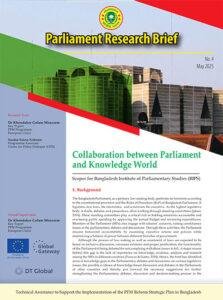 The Bangladesh Parliament, as a primary law-making body, performs its functions according to the constitutional provision and the Rules of Procedure (RoP) of Bangladesh Parliament. It legislates new laws, the electorates, and scrutinises the executive. As the highest legislative body, it drafts, debates, and passes laws, often working through standing committees (Jahan, 2014). These standing committees play a critical role in holding ministries accountable and overseeing public spending by approving the annual budget and reviewing expenditures. Members of the Parliament (MPs) also engage with citizens’ concerns, raising constituency issues at the parliamentary debates and discussions. Through these activities, the Parliament ensures horizontal accountability by examining executive actions and policies while maintaining a balance of power between different branches of government.
The Bangladesh Parliament, as a primary law-making body, performs its functions according to the constitutional provision and the Rules of Procedure (RoP) of Bangladesh Parliament. It legislates new laws, the electorates, and scrutinises the executive. As the highest legislative body, it drafts, debates, and passes laws, often working through standing committees (Jahan, 2014). These standing committees play a critical role in holding ministries accountable and overseeing public spending by approving the annual budget and reviewing expenditures. Members of the Parliament (MPs) also engage with citizens’ concerns, raising constituency issues at the parliamentary debates and discussions. Through these activities, the Parliament ensures horizontal accountability by examining executive actions and policies while maintaining a balance of power between different branches of government.
Authors: Khondaker Golam Moazzem and Nuzhat Fairuz Nobonie
Publication Period: May 2025



